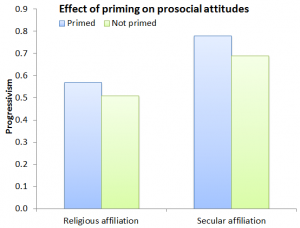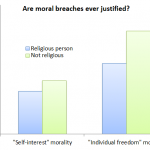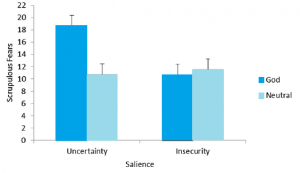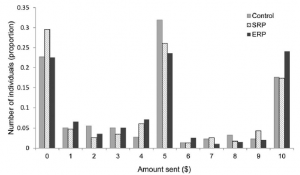Researchers around the world have found that subliminal reminders of religion can have some fairly profound effects (for example, encouraging honesty, obedience, revenge and staying power – and, as we saw in the previous post – even risk taking).
But is this specifically about religion? Perhaps being reminded about god makes people virtuous – but if that’s right, how come the effect seems to work just as well on atheists?
Nicholas Thomson, at the University of Durham in the UK, wanted to test whether or not religion was the critical ingredient here, or whether simply being reminded of social good worked just as well. So he ran a survey of just over 800 Hawaiian students to find out.
As is typical of these sorts of studies, before taking the survey questions half the group was primed to put them in a particular frame of mind. In this case, they were asked to think about which social affiliation they most identified with, why it was important to them, and what values of the social group they most admired.
 What made this study unique is that they were asked to think about any social affiliation that was important to them. So religious people could think about their religious group, but secular people could think about their own social groups.
What made this study unique is that they were asked to think about any social affiliation that was important to them. So religious people could think about their religious group, but secular people could think about their own social groups.
In a nutshell, what Thomson found was that after priming, the students tended to report more progressive, open social values. That is, they rated fairness and avoiding harm as relatively more important than obedience to authority, sticking with your in-group, and keeping pure.
That’s what the graph shows. Those with a secular affiliation are more progressive in general, as you might expect. But, regardless of their religious beliefs, students who thought good things about their social affiliation were were more progressive than those who didn’t.
If you think about it, that’s a little odd. You’d think that people reminded about their social affiliation might become more close-minded and more in favour of sticking with their in-group. But in fact the reverse happened. It made them more aware of helping others and being open to others differences.
Thomson points out that the data suggest that this effect is down to their own beliefs about their social group:
If they believe it does good (promotes prosociality, e.g., benefiting others, promotes open mindedness), then this seems to explain why the social affiliation prime promotes progressive morality.
In other words, if you believe your social group is a force for good in the world, then thinking about it will encourage you to think well of your fellow humans. Regardless of whether or not you are religious.
![]() Thomson, N. (2015). Priming social affiliation promotes morality – Regardless of religion Personality and Individual Differences, 75, 195-200 DOI: 10.1016/j.paid.2014.11.022
Thomson, N. (2015). Priming social affiliation promotes morality – Regardless of religion Personality and Individual Differences, 75, 195-200 DOI: 10.1016/j.paid.2014.11.022
 This article by Tom Rees was first published on Epiphenom. It is licensed under Creative Commons.
This article by Tom Rees was first published on Epiphenom. It is licensed under Creative Commons.















